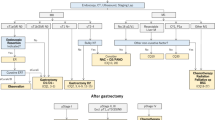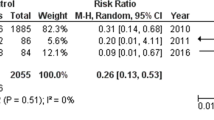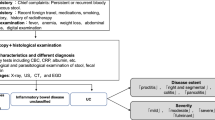Abstract
Purpose
The Palliative Care Study Group of the Multinational Association for Supportive Care in Cancer formed a subgroup to develop evidence-based recommendations on the management of constipation in patients with advanced cancer.
Methods
These recommendations were developed in accordance with the MASCC Guidelines Policy. A search strategy for Medline was developed, and the Cochrane Database of Systematic Reviews and the Cochrane Central Register of Controlled Trials were explored for relevant reviews/trials respectively. The recommendations were categorised by the level of evidence and a “category of guideline” based on the level of evidence (i.e. “recommendation”, “suggestion”, or “no guideline possible”).
Results
The group produced 15 recommendations, with varying levels of evidence and so varying categories of guideline. The recommendations relate to the assessment, the treatment, and the re-assessment of constipation.
Conclusions
These recommendations provide a framework for the management of constipation in advanced cancer, although every patient needs individualised management.
Similar content being viewed by others
References
Laugsand EA, Jakobsen G, Kaasa S, Klepstad P (2011) Inadequate symptom control in advanced cancer patients across Europe. Support Care Cancer 19:2005–2014
Noguera A, Centeno C, Librada S, Nabal M (2010) Clinical use of oral laxatives in palliative care services in Spain. Support Care Cancer 18:1491–1494
Sera L, McPherson ML (2018) Management of opioid-induced constipation in hospice patients. Am J Hosp Palliat Med 35:330–335
Larkin PJ, Cherny NI, La Carpia D, Guglielmo M, Ostgathe C, Scotte F et al (2018) Daignosis, assessment and management of constipation in advanced cancer: ESMO Clinical Practice Guidelines. Ann Oncol 29(Suppl 4):iv94–iv108
Anonymous (2010) Oxford concise medical dictionary, 8th edn. Oxford University Press, Oxford
Lindberg G, Hamid SS, Malfertheiner P, Thomsen OO, Fernandez LB, Garisch J et al (2011) World gastroenterology organisation global guideline: constipation: a global perspective. J Clin Gastroenterol 45:483–487
Walter S, Hallbook O, Gotthard R, Bergmark M, Sjodahl R (2002) A population-based study on bowel habits in a Swedish community: prevalence of faecal incontinence and constipation. Scand J Gastroenterol 37:911–916
Lee TH, Choi SC, Park MI, Park KS, Shin JE, Kim SE, Jung KW, Koo HS, Kim WJ, Cho YK, Kim YS, Lee JS, (2014) Constipation misperception is associated with gender, marital status, treatment utilization and constipation symptoms experienced. J Neurogastroenterol Motil 20:379–387
Lacy BE, Mearin F, Chang L, Chey WD, Lembo AJ, Simren M, Spiller R (2016) Bowel disorders. Gastroenterology 150:1393–1407
Farmer AD, Drewes AM, Chiarioni G, De Giorgio R, O’Brien T, Morlion B et al (2018) Pathophysiology and management of opioid-induced constipation: European expert consensus statement. United European Gastroenterol J
Laugsand EA, Skorpen F, Kaasa S, Sabatowski R, Strasser F, Fayers P, Klepstad P (2015) Genetic and non-genetic factors associated with constipation in cancer patients receiving opioids. Clin Transl Gastroenterol 6:e90
Hadley G, Derry S, Moore RA, Wiffen PJ (2013) Transdermal fentnayl for cancer pain. Cochrane Database of Systematic Reviews Issue 10. Art. No.: CD010270
Fallon MT, Hanks GW (1999) Morphine, constipation and performance status in advanced cancer patients. Palliat Med 13:159–160
Camilleri M, Drossman DA, Becker G, Webster LR, Davies AN, Mawe GM (2014) Emerging treatments in neurogastroenterology: a multidisciplinary working group consensus statement on opioid-induced constipation. Neurogastroenterol Motil 26:1386–1395
Suares NC, Ford AC (2011) Prevalence of, and risk factors for, chronic idiopathic constipation in the community: systematic review and meta-analysis. Am J Gastroenterol 106:1582–1591
Larkin PJ, Sykes NP, Centeno C, Ellershaw JE, Elsner F, Eugene B, Gootjes JRG, Nabal M, Noguera A, Ripamonti C, Zucco F, Zuurmond WWA, On behalf of The European Consensus Group on Constipation in Palliative Care (2008) The management of constipation in palliative care: clinical practice recommendations. Palliat Med 22:796–807
Oosten AW, Oldenmenger WH, Mathijssen RH, van der Rijt CC (2015) A systematic review of prospective studies reporting adverse events of commonly used opioids for cancer-related pain: a call for the use of standardized outcome measures. J Pain 16:935–946
Johanson JF, Kralstein J (2007) Chronic constipation: a survey of the patient perspective. Aliment Pharmacol Ther 25:599–608
Davies A, Webber K (2015) Stercoral perforation of the colon: a potentially fatal complication of opioid-induced constipation. J Pain Symptom Manag 50:260–262
Yamada N, Nakamura M, Ishikura K, Ota M, Yazu T, Ota S, Ito M, Fujioka H, Isaka N, Nakano T (2005) Triggers of acute pulmonary thromboembolism devleoped in hospital, with focusing on toliet activities as triggering acts. Int J Cardiol 98:409–411
Dhingra L, Shuk E, Grossman B, Strada A, Wald E, Portenoy A, Knotkova H, Portenoy R (2013) A qualitative study to explore psychological distress and illness burden associated with opioid-induced constipation in cancer patients with advanced disease. Palliat Med 27:447–456
Friedrichsen M, Erichsen E (2004) The lived experience of constipation in cancer patients in palliative hospital-based home care. Int J Palliat Nurs 10:321–325
Hjalte F, Berggren A-C, Bergendahl H, Hjortsberg C (2010) The direct and indirect costs of opioid-induced constipation. J Pain Symptom Manag 40:696–703
Hess B, Bernardi M, Klotz H-P (2011) Attitude of Swiss physicians towards opioid-induced constipation: a national survey. Eur J Intern Med 22:527–531
Multinational Association for Supportive Care in Cancer Guidelines Policy: https://www.mascc.org/assets/Toolbox/PoliciesForms/mascc_guideline_policy_2018.pdf Accessed 4th November 2018
National Cancer Institute Dictionary of Cancer https://www.cancer.gov/publications/dictionaries/cancer-terms Accessed 4th November 2018
Cochrane Database of Systematic Reviews: https://www.cochranelibrary.com/cdsr/about-cdsr Accessed 4th November 2018
Cochrane Central Register of Controlled Trials (CENTRAL): https://www.cochranelibrary.com/central/about-central Accessed 4th November 2018
National Institute for Health and Care Excellence (2015) Naloxegol for treating opioid-induced constipation. Technology Appraisal Guidance [TA345]. NICE, London
Lewis SJ, Heaton KW (1997) Stool form scale as a useful guide to intestinal transit time. Scand J Gastroenterol 32:920–924
Clark K, Currow DC, Talley NJ (2010) The use of digital rectal examinations in palliative care patients. J Palliat Med 13:797
Palsson OS, Whitehead WE, van Tilburg MA, Chang L, Chey W, Crowell MD et al (2016) Development and validation of the Rome IV Diagnostic Questionnaire for adults. Gastroenterology 150:1481–1491
Starreveld JS, Pols MA, Van Wijk HJ, Bogaard JW, Poen H, Smout AJ (1990) The plain abdominal radiograph in the assessment of constipation. Z Gastroenterol 28:335–338
Nagaviroj K, Yong WC, Fassbender K, Zhu G, Oneschuk D (2011) Comparison of the constipation assessment scale and plain abdominal radiography in the assessment of constipation in advanced cancer patients. J Pain Symptom Manag 42:222–228
Dzierzanowski T, Cialkowska-Rysz A (2015) Behavioral risk factors of constipation in palliative care patients. Support Care Cancer 23:1787–1793
Emmanuel A (2011) Current management strategies and therapeutic targets in chronic constipation. Ther Adv Gastroenterol 4:37–48
Cherny N, Ripamonti C, Pereira J, Davis C, Fallon M, McQuay H, Mercadante S, Pasternak G, Ventafridda V, for the Expert Working Group of the European Association of Palliative Care Network (2001) Strategies to manage the adverse effects of oral morphine: an evidence-based report. J Clin Oncol 19:2542–2554
Candy B, Jones L, Larkin PJ, Vickerstaff V, Tookman A, Stone P (2015) Laxatives for the management of constipation in people receiving palliative care. Cochrane Database of Systematic Reviews Issue 5. Art. No.: CD003448
Brandt LJ, Prather CM, Quigley EM, Schiller LR, Shoenfeld P, Talley NJ (2005) Systematic review on the management of chronic constipation in North America. Am J Gastroenterol 100:S5–S22
Lee-Robichaud H, Thomas K, Morgan J, Nelson RL (2010) Lactulose vesrus polyethylene glycol for chronic constipation. Cochrane Database of Systematic Reviews Issue 7. Art. No.: CD007570
American Gastroenterological Association (2013) American Gastroenterological Association medical position statement on constipation. Gastroenerology 144:211–217
Librach SL, Bouvette M, De Angelis C, Farley J, Oneschuk D, Pereira JL et al (2010) Consensus recommendations for the management of constipation in patients with advanced, progressive illness. J Pain Symptom Manag 40:761–773
British Medical Association and the Royal Pharmaceutical Society (2017) British National Formulary 74. Pharmaceutical Press, Basingstoke
Ford AC, Suares NC (2011) Effect of laxatives and pharmacological therpaies in chronic idiopathic constipation: systematic review and meta-analysis. Gut 60:209–218
Thomas J, Karyer S, Cooney GA, Chamberlain BH, Watt CK, Slatkin NE et al (2008) Methylnaltrexone for opioid-induced constipation in advanced illness. N Engl J Med 358: 2332-2343. Send to
Rauck R, Slatkin NE, Stambler N, Harper JR, Israel RJ (2017) Randomized, double-blind trial of oral methylnaltrexone for the treatment of opioid-induced constipation in patients with chronic noncancer pain. Pain Pract 17:820–828
Chey WD, Webster L, Sostek M, Lappalainen J, Barker PN, Tack J (2014) Naloxegol for opioid-induced constipation in patients with noncancer pain. N Engl J Med 370:2387–2396
Katakami N, Harada T, Murata T, Shinozaki K, Tsutsumi M, Yokota T, Arai M, Tada Y, Narabayashi M, Boku N (2017) Randomized phase III and extension studies of naldemedine in patients with opioid-induced constipation and cancer. J Clin Oncol 35:3859–3866
Candy B, Jones L, Vickerstaff V, Larkin PJ, Stone P (2018) Mu-opioid anatagonists for opioid-induced bowel dysfunction in people with cancer and people receiving palliative care. Cochrane Database of Systematic Reviews Issue 6. Art. No.: CD006332
Nee J, Zakari M, Sugarman MA, Whelan J, Hirsch W, Sultan S, Ballou S, Iturrino J, Lembo A (2018) Efficacy of treatments for opioid-induced constipation: systematic review and meta-anlysis. Clin Gastroenterol Hepatol 16:1569–1584
Sykes NP (1996) An investigation of the ability of oral naloxone to correct opioid-related constipation in patients with advanced cancer. Palliat Med 10:135–144
Dupoiron D, Stachowiak A, Loewenstein O, Ellery A, Kremers W, Bosse B, Hopp M (2017) A phase III randomized controlled study on the efficacy and improved bowel function of prolonged-release (PR) oxycodone-naloxone (up to 160/80 mg daily) vs oxycodone PR. Eur J Pain 21:1528–1537
Clark K, Byfieldt N, Dawe M, Currow DC (2012) Treating constipation in palliative care: the impact of other factors aside from opioids. Am J Hosp Palliat Care 29:122–125
Cryer B, Katz S, Vallejo R, Popescu A, Ueno R (2014) A randomized study of lubiprostone for opioid-induced constipation in patients with chronic noncancer pain. Pain Med 15:1825–1834
Sloots CE, Rykx A, Cools M, Kerstens R, De Pauw M (2010) Efficacy and safety of prucalopride in patients with chronic noncancer pain suffering from opioid-induced costipation. Dig Dis Sci 55:2912–2921
Caraceni A, Hanks G, Kaasa S, Bennett MI, Brunelli C, Cherny N, Dale O, de Conno F, Fallon M, Hanna M, Haugen DF, Juhl G, King S, Klepstad P, Laugsand EA, Maltoni M, Mercadante S, Nabal M, Pigni A, Radbruch L, Reid C, Sjogren P, Stone PC, Tassinari D, Zeppetella G (2012) Use of opioid analgesics in the treatment of cancer pain: evidence-based recommendations from the EAPC. Lancet Oncol 13:e58–e68
National Comprehensive Cancer Network (2018) Adult cancer pain version 1.2018. National Comprehensive Cancer Network, Plymouth Meeting
Ishihara M, Ikesue H, Matsunaga H, Suemaru K, Kitaichi K, Suetsugu K, Oishi R, Sendo T, Araki H, Itoh Y (2012) A multi-institutional study analyzing effect of prophylactic medication for prevention of opioid-induced gastrointestinal dysfunction. Clin J Pain 28:373–381
Wilkinson-Smith V, Bharucha AE, Emmanuel A, Knowles C, Yiannakou Y, Corsetti M (2018) When all else seems lost: management of refractory constipation - surgery, rectal irrigation, percutaneous endoscopic colostomy, and more. Neurogastroenterol Motil 30:e13352
Lau CH, Wu X, Chung VC, Liu X, Hui EP, Cramer H et al (2016) Acupuncture and related therapies for symptom management in palliative cancer care: systematic review and meta-analysis. Medicine (Baltimore) 95:e2901
Lai TK, Cheung MC, Lo CK, Ng KL, Fung YH, Tong M et al (2011) Effectiveness of aroma massage on advanced cancer patients with constipation: a pilot study. Complement Ther Clin Pract 17:37–43
Tavares CN, Kimbrel JM, Protus BM, Grauer PA (2014) Petroleum jelly (vaseline balls) for the treatment of constipation: a survey of hospice and palliative care practitioners. Am J Hosp Palliat Care 31:797–803
Mercadante S, Ferrera P, Casuccio A (2011) Effectiveness and tolerability of amidotrizoate for the treatment of constipation resistant to laxatives in advanced cancer patients. J Pain Symptom Manag 41:421–425
Rubiales AS, Hernansanz S, Gutierrez C, Del Valle ML, Flores LA (2006) Neostigmine for refractory constipation in advanced cancer patients. J Pain Symptom Manag 32:204–205
Argoff CE, Brennan MJ, Camilleri M, Davies A, Fudin J, Galluzzi KE, Gudin J, Lembo A, Stanos SP, Webster LR (2015) Consensus recommendations on initiating prescription therapies for opioid-induced constipation. Pain Med 16:2324–2337
Rentz AM, Yu R, Muller-Lissner S, Leyendecker P (2009) Validation of the Bowel Function Index to detect clinically meaningful changes in opioid-induced constipation. J Med Econ 12:371–383
Author information
Authors and Affiliations
Corresponding author
Ethics declarations
Conflict of interest
ADavies has received personal fees and research funding from Kyowa Kirin; CL has received personal fees from Kyowa Kirin; ADickman has received personal fees from Kyowa Kirin; DF has received personal fees from Novartis, Pfizer, and Roche.
Additional information
Publisher’s note
Springer Nature remains neutral with regard to jurisdictional claims in published maps and institutional affiliations.
Appendices
Appendix 1. Medline search strategy
-
1.
Constipation—mesh
OR (search terms 2–50)
- 2.
Defecation—mesh
- 3.
Laxatives—mesh
- 4.
Cathartics—mesh
- 5.
Aperients—keyword
- 6.
Bulk forming laxatives—keyword
- 7.
Ispaghula husk—keyword
- 8.
Methylcellulose—mesh
- 9.
Sterculia—mesh
- 10.
Frangula—mesh
- 11.
Chloride channel agonists—mesh
- 12.
Lubiprostone—mesh
- 13.
Osmotic laxatives—keyword
- 14.
Lactulose—mesh
- 15.
Macrogol—keyword
- 16.
Polyethylene glycols—mesh
- 17.
Magnesium hydroxide—mesh
- 18.
Sodium acid phosphate—keyword
- 19.
Serotonin 5-HT4 receptor agonists—mesh
- 20.
Prucalopride—keyword
- 21.
Stimulant laxatives—keyword
- 22.
Bisacodyl—mesh
- 23.
Co-danthramer—keyword
- 24.
Dantron—keyword
- 25.
Poloxamer—mesh
- 26.
Co-danthrusate—keyword
- 27.
Glycerol—mesh
- 28.
Senna—keyword
- 29.
Senna extract—mesh
- 30.
Senna plant—mesh
- 31.
Anthraquinones—mesh
- 32.
Sodium picosulfate—keyword
- 33.
Opioid receptor antagonists—keyword
- 34.
Narcotic antagonists—mesh
- 35.
Peripherally acting mu-opioid receptor antagonist—keyword
- 36.
Methylnaltrexone—keyword
- 37.
Naloxegol—keyword
- 38.
Softening drugs—keyword
- 39.
Arachis oil—keyword
- 40.
Docusate sodium—keyword
- 41.
Dioctyl sulfosuccinic acid—mesh
- 42.
Liquid paraffin—keyword
- 43.
Mineral oil—mesh
- 44.
Bowel cleansing—keyword
- 45.
Enema—mesh
- 46.
Suppositories—mesh
- 47.
Dietary fiber—mesh
- 48.
Psyllium—keyword
- 49.
Fecal impaction—mesh
- 50.
Disimpaction—keyword
AND (search terms 51–52)
- 51.
Neoplasms—mesh
OR
- 52.
Cancer—keyword
Appendix 2. MASCC criteria for grading recommendations
Rights and permissions
About this article
Cite this article
Davies, A., Leach, C., Caponero, R. et al. MASCC recommendations on the management of constipation in patients with advanced cancer. Support Care Cancer 28, 23–33 (2020). https://doi.org/10.1007/s00520-019-05016-4
Received:
Accepted:
Published:
Issue Date:
DOI: https://doi.org/10.1007/s00520-019-05016-4




